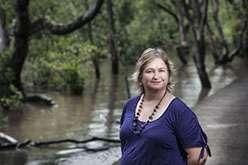Flood aftermath linked to post-traumatic stress

Brisbane flood victims suffered more psychological distress during the rebuilding phase than as waters inundated their homes and businesses, a QUT study has found.
Kelly Dixon, from QUT's School of Psychology and Counselling, has looked at the mental health impacts caused by the Brisbane 2011 and the Mackay 2008 flood disasters.
"The findings showed that aftermath stress contributed to poor mental health outcomes over and above the flood itself, prior mental health issues and demographic factors," Ms Dixon said.
Presenting her findings at the Australian and New Zealand Disaster and Emergency Management Conference this month, Ms Dixon said while the flood was frightening on the day, the most difficult aspect for many people was the aftermath including the clean-up, the re-building process and dealing with insurance companies.
As part of her research, Ms Dixon surveyed more than 150 flood victims to find out what factors were best able to predict post-traumatic stress and depression 7-9 months after the Brisbane 2011 flood and 3.5 years after the Mackay 2008 flood.
"Aftermath stress was the strongest predictor of post-traumatic stress symptoms with 75 per cent of people saying the most difficult aspect was the aftermath and dealing with insurance companies," she said.
"For example, people who found their insurance company to be helpful, described less stress overall, whereas those who had difficulty with the insurance process were more likely to describe the flood aftermath period as extremely stressful," she said.
"Victims' biggest complaints and stressors were around insurance company staff giving conflicting information, delays in assessing claims, not covering flooding, or not being adequately compensated for losses.
"What this shows is insurance companies need to look at ways to reduce undue stress, such as by streamlining their procedures, training staff in these procedures and providing claimants with clear, easy to following instructions on how to make their claim.
"The study found the strongest predictors of depression were prior mental health, repair time and self-efficacy (confidence in their ability to cope)."
Ms Dixon said the fact that the time it took to repair homes was one of the strongest predictors of depression, highlighted the need to continue supporting victims for as long as required.
"Rebuilding from a natural disaster can take months or even years and disaster victims may feel increasingly reluctant to ask for help as time goes on," she said.
"This highlights a need for people involved in the community recovery efforts to continue to provide support, especially when there are delays in rebuilding works.
"Feedback from flood victims showed those people who had adequate practical help and emotional support were more resilient.
"There is also a greater need for co-ordination of tradespeople so that unnecessary delays are not caused by people taking on too much work."
Ms Dixon said there had also been positives to come out of the floods.
"It is important to recognise that the majority of people were quite resilient and are not suffering any long term ill-effects," Ms Dixon said.
"Additionally, many survivors had in fact grown through their experience, and now reported greater resilience and feeling like they had more personal strength.
"Survivors said they were more confident they could cope with difficult circumstances in the future and they had found the experience had strengthened their relationships and social networks."

















